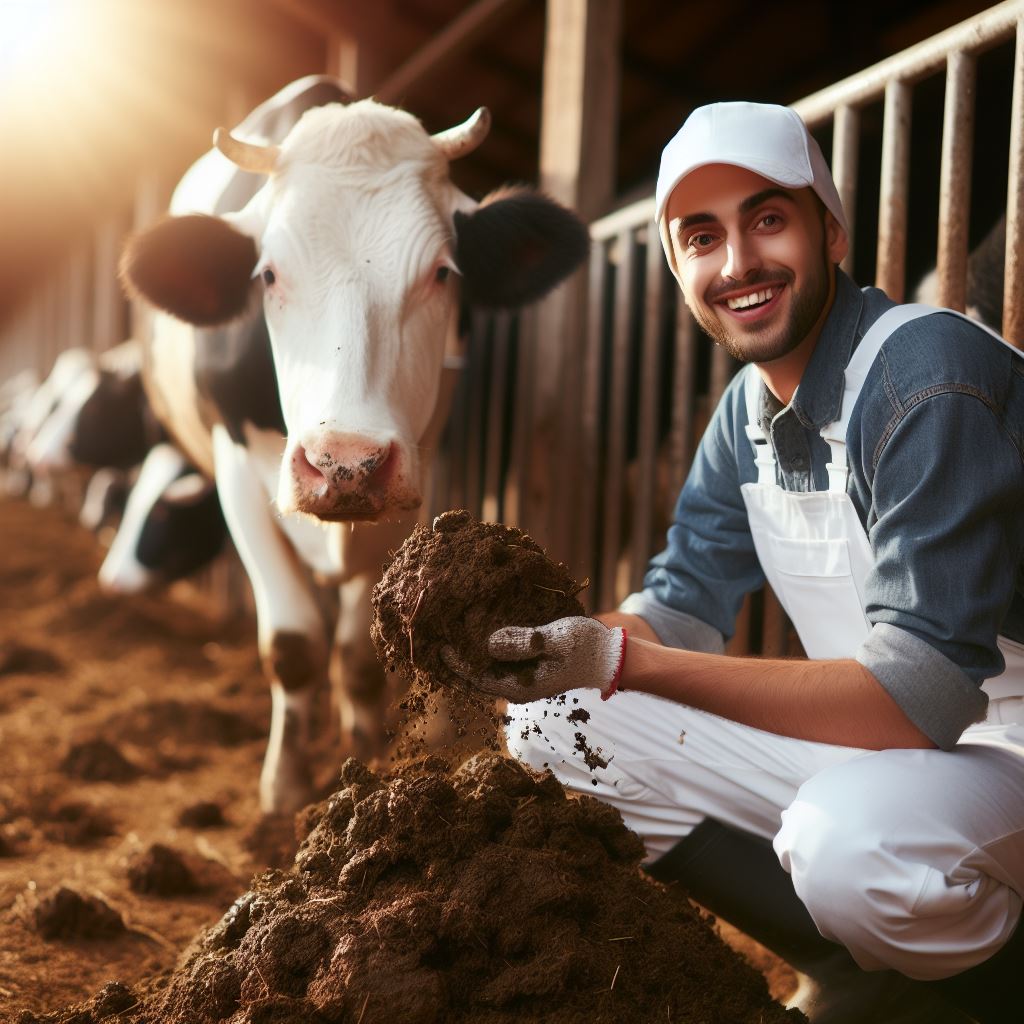Introduction
Composting is a vital practice in sustainable farming, offering myriad benefits to both the environment and agriculture.
By transforming organic waste into nutrient-rich compost, farmers can improve soil health, conserve resources, and reduce waste.
Imagine a world where straws, leaves, eggshells, and leftovers were transformed into fertile soil.
In this post, we will explore the transformation of organic waste into gold for farms.
With the increasing global population and the demand for food surging, traditional farming practices often rely on chemical fertilizers and pesticides that harm the environment.
However, composting presents an eco-friendly alternative.
One of the prominent advantages of composting is the enrichment of soil.
By decomposing organic matter, compost releases essential minerals and nutrients, promoting the growth of healthy crops.
Additionally, compost enhances soil structure, improving water retention and preventing erosion.
Composting also aids in waste management. Instead of sending organic waste to landfills, where it emits methane, a potent greenhouse gas, composting redirects these materials to a more productive and sustainable path.
This not only reduces greenhouse gas emissions but also minimizes reliance on synthetic fertilizers.
Moreover, composting reduces the need for chemical inputs, benefiting both human health and the ecosystem.
By fostering natural processes and increasing soil biodiversity, composting promotes a balance that is often disrupted by conventional farming practices.
In short, composting serves as an invaluable tool for sustainable farming.
By embracing this practice, farmers can reduce their environmental footprint, improve soil quality, and contribute to a more resilient and efficient agricultural system.
Transform Your Agribusiness
Unlock your farm's potential with expert advice tailored to your needs. Get actionable steps that drive real results.
Get StartedSo, let’s dive into the world of composting and unlock the potential of organic waste.
What is composting
Composting is a natural process that converts organic waste into nutrient-rich compost.
It is a way to recycle organic materials and create a valuable product that can be used to improve soil fertility and support plant growth.
In this blog section, we will explore the definition of composting, how it works, the organic waste cycle, and the different methods of composting.
Definition of Composting
Composting is the decomposition of organic materials, such as food scraps, yard waste, and animal manure, by microorganisms in a controlled environment.
Explanation of How Composting Works
Composting works through the collaboration of microorganisms, including bacteria, fungi, and insects.
These microorganisms break down the organic materials, converting them into stable organic matter called humus.
Breakdown of the Organic Waste Cycle
The organic waste cycle starts with the collection of organic materials, such as kitchen scraps, grass clippings, and leaves.
These materials are then combined in a composting pile or bin.
Over time, microorganisms break down the organic matter into compost, which can be used as a beneficial soil amendment.
Types of Composting Methods
- Aerobic Composting: This method requires oxygen and uses microorganisms that thrive in the presence of air.
It involves regularly turning the compost pile to provide oxygen and ensure proper decomposition - Anaerobic Composting: In contrast to aerobic composting, anaerobic composting occurs in the absence of oxygen.
It is a slower process and produces a different type of compost. Anaerobic composting can be done in sealed containers or pits. - Vermicomposting: Vermicomposting involves the use of worms to break down organic waste.
Red worms, such as Eisenia fetida, are commonly used for vermicomposting as they consume organic materials and produce nutrient-rich castings.
Benefits of Composting
- Soil Enrichment: Compost improves soil structure, fertility, and water-holding capacity, leading to healthier plant growth.
- Waste Reduction: Composting diverts organic waste from landfills, reducing methane emissions and contributing to waste reduction efforts.
- Carbon Sequestration: When organic materials decompose aerobically, they release carbon dioxide. However, using compost as a soil amendment helps sequester carbon, mitigating climate change impacts.
- Chemical-free Fertilizer: Compost provides a natural alternative to synthetic fertilizers, reducing the reliance on chemical inputs in agriculture.
- Cost Savings: By producing compost on-site, farmers and gardeners can save money on purchasing commercial fertilizers.
Tips for Successful Composting
- Balance the ratio of carbon-rich materials (e.g., dry leaves, straw) and nitrogen-rich materials (e.g., kitchen scraps, grass clippings) for optimum decomposition.
- Maintain proper moisture levels in the compost pile. It should be moist but not waterlogged.
- Turn the compost pile regularly to aerate it and speed up the decomposition process.
- Avoid adding meat, dairy products, and oily foods to the compost pile, as they can attract pests.
Composting is a simple, yet powerful, way to convert organic waste into a valuable resource for farming and gardening.
By understanding the different composting methods and following a few tips, anyone can contribute to reducing waste, improving soil health, and promoting sustainable agriculture.
Start composting today and witness the transformation of organic waste into farm gold.
Read: Organic Livestock: Raising Animals Naturally
Benefits of composting
Composting is not just a waste management practice, but also an environmentally beneficial process.
Environmental Benefits of Composting
- Reduces methane emissions, which are a potent greenhouse gas and contribute to climate change.
- Conserves water by improving soil structure and reducing runoff, which helps prevent water pollution.
- Reduces the need for chemical fertilizers, minimizing the release of synthetic nutrients into the environment.
Compost’s Role in Soil Health and Structure Improvement
Compost is a valuable soil amendment that enhances soil health and structure in several ways:
- Improves soil structure by increasing its ability to retain water and nutrients.
- Enhances soil aeration and drainage, reducing the risk of waterlogging and erosion.
- Increases soil organic matter content, promoting biodiversity and beneficial microbial activity.
- Suppresses soil-borne diseases, reducing the need for harmful pesticides.
Enhanced Nutrient Cycling and Availability for Plants
Compost plays a crucial role in enhancing nutrient cycling and making essential nutrients more available to plants:
- Supplies a wide range of nutrients, including nitrogen, phosphorus, and potassium, in an organic and slow-release form.
- Increases the cation exchange capacity of the soil, improving nutrient retention and release to plants.
- Provides beneficial microorganisms that aid in nutrient mineralization, making them accessible to plant roots.
- Buffers pH levels, ensuring optimal nutrient uptake by plants.
Potential Cost Savings for Farmers through Compost Usage
Farmers can achieve significant cost savings by incorporating compost into their agricultural practices:
- Reduces the reliance on costly chemical fertilizers, resulting in lower input costs for nutrient management.
- Improves soil fertility and reduces the need for synthetic soil amendments, saving money on external inputs.
- Enhances water holding capacity, reducing irrigation requirements and associated expenses.
- Minimizes pest and disease pressure, decreasing the reliance on expensive pesticides and fungicides.
In fact, composting offers numerous environmental benefits, such as reducing greenhouse gas emissions, conserving water, and minimizing the use of chemical fertilizers.
Additionally, compost improves soil health, enhances nutrient availability for plants, and can lead to significant cost savings for farmers.
Incorporating compost into agricultural practices is like turning organic waste into farm gold.
Read: Seed Selection: Core of Organic Crop Quality
Organic waste suitable for composting
Various types of organic waste that can be composted
- Kitchen scraps such as fruit and vegetable peels, coffee grounds, eggshells, and tea bags.
- Yard waste including grass clippings, leaves, and small branches.
- Livestock manure from cows, horses, chickens, and other animals.
- Plant trimmings like pruned branches, weeds, and dead plants.
The importance of proper waste segregation and avoiding certain materials in compost piles
Proper waste segregation is crucial for successful composting. Here’s why:
- Avoid plastics and metals: These materials don’t decompose and can contaminate the compost with harmful substances.
- Prevent the spread of diseases: Segregating waste prevents the introduction of pathogens that may affect your compost and, eventually, your plants.
- Maintain a balanced compost: Certain materials like meat, dairy, and oily foods can attract pests and create unpleasant odors.
The composting potential of different organic materials based on their carbon to nitrogen ratios (C:N ratio)
The C:N ratio is crucial for proper decomposition and nutrient balance in compost. Here are some examples:
Showcase Your Farming Business
Publish your professional farming services profile on our blog for a one-time fee of $200 and reach a dedicated audience of farmers and agribusiness owners.
Publish Your Profile- High-C materials: These materials provide carbon and include dried leaves, straw, cardboard, and sawdust. They have a C:N ratio greater than 30:1.
- High-N materials: These materials provide nitrogen and include green leaves, grass clippings, kitchen scraps, and fresh manure. They have a C:N ratio less than 30:1.
- Optimal C:N ratio: For successful composting, the ideal C:N ratio is between 25:1 and 30:1. This ensures a balanced decomposition process.
Combining high-C and high-N materials in the right proportions helps maintain an optimal C:N ratio, promoting decomposition and nutrient availability in the compost.
In essence, composting organic waste is an effective way to reduce landfill waste and create nutrient-rich soil amendments.
By composting a variety of organic materials, properly segregating waste, and considering carbon to nitrogen ratios, you can create valuable “farm gold” to enrich your garden and contribute to a sustainable future.
Read: Harvesting Hope: Stories from Organic Farmers

Composting process
Composting is a natural process that transforms organic waste into nutrient-rich compost for gardening purposes.
By creating a compost pile, you can contribute to sustainable waste management and improve the health of your soil.
In this section, we will explore the steps involved in creating a compost pile, discuss the ideal conditions for successful composting, and address common challenges or mistakes to avoid.
Creating a compost pile
- Layering: Start by creating alternating layers of green and brown materials.
Green materials include fresh grass clippings, vegetable scraps, and coffee grounds, while brown materials consist of dry leaves, straw, and shredded newspaper. Aim for a 3:1 ratio of brown to green materials. - Turning: Regularly turn the compost pile with a pitchfork or shovel. This helps aerate the pile and speeds up decomposition by providing oxygen to the microorganisms.
Turn the pile every one to two weeks to ensure even decomposition. - Watering: Keep the compost pile moist but not saturated. Ideally, it should have the consistency of a damp sponge. If the pile is too dry, the decomposition process will slow down.
On the other hand, excessive moisture can lead to unpleasant odors and attract pests. Water the pile as needed, particularly during dry periods. - Monitoring temperature and moisture levels: Use a compost thermometer to monitor the temperature of the pile. The ideal temperature range for successful composting is between 110°F and 160°F (43°C – 71°C).
Temperatures above 160°F (71°C) can kill beneficial microorganisms, while temperatures below 110°F (43°C) may indicate a lack of microbial activity. Additionally, check the moisture levels regularly, aiming for 40-60% moisture content.
Ideal conditions for successful composting
- Proper aeration: Oxygen is essential for the decomposition process. Ensure good airflow within the compost pile by turning it regularly and avoiding compacting the materials too tightly.
- Temperature range: The activity of microorganisms responsible for breaking down the organic matter is accelerated within the temperature range of 110°F to 160°F (43°C – 71°C).
- Moisture content: Maintaining adequate moisture is crucial. The compost pile should be moist, but not excessively wet or dry. A moisture content of 40-60% is ideal.
Challenges and mistakes to avoid
- Lack of aeration: Without proper airflow, the compost pile may become anaerobic, resulting in unpleasant odors and slow decomposition. Regular turning is essential to maintain a well-aerated environment.
- Incorrect carbon-to-nitrogen ratio: The compost pile should have a balanced ratio of carbonaceous (brown) and nitrogen-rich (green) materials. Too much nitrogen can lead to a smelly pile, while too much carbon can slow down decomposition.
- Adding inappropriate materials: Avoid composting meat, bones, dairy products, oils, and fats as they can attract pests and cause odor problems. Additionally, avoid adding weeds with mature seeds to prevent weed growth in the compost.
- Inadequate moisture: A dry compost pile will decompose slowly, while excessive moisture can lead to a slimy, smelly pile. Regularly check and adjust the moisture levels to create the optimal conditions.
In general, composting is a simple yet effective way to recycle organic waste and create nutrient-rich compost for gardening.
By following the steps mentioned above and maintaining the ideal conditions of aeration, temperature, and moisture, you can successfully create compost while avoiding common challenges and mistakes.
So, start composting today and turn your organic waste into farm gold!
Read: Eco-Friendly Pest Management in Organic Farms
Application of Compost on Farms
Farms can greatly benefit from the application of compost, as it offers various uses and advantages for agricultural practices.
Here are some different ways compost can be utilized on farms:
The different ways compost can be used on farms
Soil Amendment
Compost can be used as a soil amendment to improve overall soil quality and fertility.
By mixing compost into the soil, it helps enhance its structure, moisture retention, and nutrient content.
Mulching
Another valuable application of compost is using it as a mulch.
When spread on the soil surface around plants, compost acts as a protective layer, helping to conserve moisture, suppress weeds, and regulate soil temperature.
Erosion Control
Compost can also play a significant role in preventing soil erosion on farms.
By effectively covering exposed soil with a layer of compost, it acts as a protective barrier against wind or water erosion, keeping the soil in place.
Importance of Proper Compost Application Techniques
Applying compost correctly is crucial to maximizing its benefits and ensuring successful farm operations.
Here are the key aspects to consider:
Timing
Timing is essential when applying compost.
It should be done during the appropriate season and well before planting to allow the compost to decompose and release nutrients gradually, benefitting the crops over an extended period.
Quantity
A proper understanding of the ideal quantity of compost is necessary.
It should be applied in the right proportion to avoid suffocating plant roots or creating nutrient imbalances that could harm the crops.
Mixing with Topsoil
For optimum results, compost should be thoroughly mixed with the topsoil.
This ensures uniform distribution of nutrients and organic matter throughout the soil, leading to better plant growth and overall farm productivity.
Success Stories of Farms Benefiting from Compost Usage
Many farms have experienced remarkable success by incorporating compost into their agricultural practices.
Here are a few inspiring real-life examples:
Green Acres Farm
Green Acres Farm struggled with poor soil quality and decreased yields for years.
However, after implementing regular compost applications, their soil fertility improved significantly, resulting in bountiful harvests and increased profitability.
Sunnyvale Orchard
Sunnyvale Orchard faced challenges with soil erosion, especially during heavy rains.
By applying compost as an erosion control measure, they successfully protected their orchard from the negative effects of erosion, preserving their valuable topsoil.
Harvest Fields Ranch
Harvest Fields Ranch focused on sustainable agriculture and reduced their reliance on synthetic fertilizers by incorporating compost as a soil amendment.
This allowed them to produce healthier, more nutritious crops while minimizing their environmental impact.
In a nutshell, the application of compost on farms offers a range of benefits, including improved soil fertility, weed suppression, moisture conservation, erosion control, and reduced dependence on chemical fertilizers.
By following proper compost application techniques, farmers can harness its potential and witness remarkable success in their agricultural endeavors.
Conclusion
Composting organic waste is a vital practice for farms, providing numerous benefits to both the environment and agricultural productivity.
By composting, organic waste is transformed into nutrient-rich fertilizer that can enhance soil quality, resulting in healthier plants and higher crop yields.
Composting also reduces the need for chemical fertilizers, minimizing the risk of water and soil pollution, thus promoting a sustainable farming system.
Showcase Your Farming Business
Publish your professional farming services profile on our blog for a one-time fee of $200 and reach a dedicated audience of farmers and agribusiness owners.
Publish Your ProfileAdditionally, composting helps to divert organic waste from landfills, reducing greenhouse gas emissions and contributing to the fight against climate change.
It is crucial for farmers and individuals alike to recognize the importance of composting and take action to improve their composting practices.
By starting to compost or refining existing composting methods, we can make a significant positive impact on our surroundings.
Encouragingly, composting can be done at varying scales, from small-scale household composting to large-scale industrial operations.
Research suggests that proper composting techniques and management can lead to improved soil structure, moisture retention, and nutrient availability.
Furthermore, composting helps to foster the growth of beneficial microorganisms in the soil, promoting healthy ecosystems and biodiversity.
Composting organic waste is a win-win solution that not only tackles waste management but also supports sustainable farming practices.
It is time for everyone to recognize the potential of composting and actively participate in this simple yet effective method to recycle organic waste and create farm gold.




